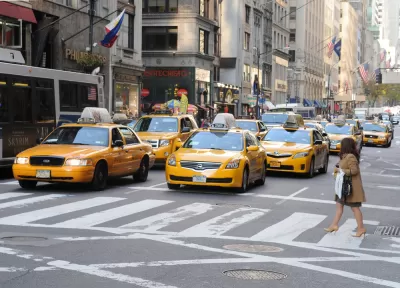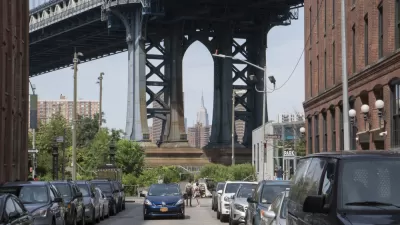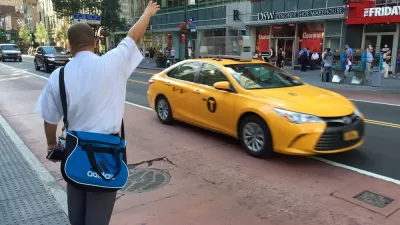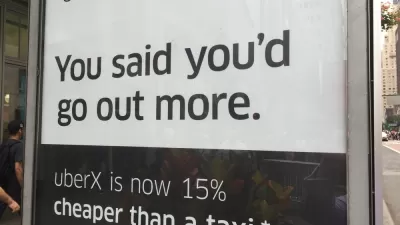A shortage of drivers and spiking demand are driving Uber and Lyft prices higher than ever as the companies struggle to achieve profitability.

A "perfect storm of extremely high demand and extremely low supply" is driving prices for ride-hailing services to all-time highs, reports Alissa Walker in Curbed. "The labor shortage is not unique to ride-hailing, but the situation is particularly dire right now at Uber and Lyft, where morale among its gig workers is low."
In New York City, the shortage is compounded by similar problems in the taxi industry. "There are two-thirds fewer cabs on New York City streets — only 3,500 per day compared to 10,500 before the pandemic — and it’s not clear how many of those taxis will ever return." Meanwhile, New Yorkers are filling the gap with lesser-known options like Via and The Drivers Cooperative.
Mobility advocates hope that the current reckoning will highlight the problems with Uber's unsustainable business model and encourage people to seek other alternatives. "'Uber has been losing billions of dollars for years and years,' says Robin Chase, founder of the New Urban Mobility Alliance." It seems like the days of the "Millennial Lifestyle Subsidy," when techy startups funded by venture capitalists "allowed us to live Balenciaga lifestyles on Banana Republic budgets," are over. According to Chase, "[r]aising their prices is the only way they’ll ever break even or become profitable."
While New Yorkers bought more cars during the pandemic, they also sought out biking and transit options. "Citi Bike posted two all-time daily ridership records on back-to-back days last month," says Walker. "With summer weather ahead, shared scooters soon to hit streets, and 24/7 subway service restored, maybe a few months of high Uber prices won’t be the worst thing for New York."
FULL STORY: Why Your Uber Ride Is Suddenly Costing a Fortune

Planetizen Federal Action Tracker
A weekly monitor of how Trump’s orders and actions are impacting planners and planning in America.

Maui's Vacation Rental Debate Turns Ugly
Verbal attacks, misinformation campaigns and fistfights plague a high-stakes debate to convert thousands of vacation rentals into long-term housing.

Restaurant Patios Were a Pandemic Win — Why Were They so Hard to Keep?
Social distancing requirements and changes in travel patterns prompted cities to pilot new uses for street and sidewalk space. Then it got complicated.

In California Battle of Housing vs. Environment, Housing Just Won
A new state law significantly limits the power of CEQA, an environmental review law that served as a powerful tool for blocking new development.

Boulder Eliminates Parking Minimums Citywide
Officials estimate the cost of building a single underground parking space at up to $100,000.

Orange County, Florida Adopts Largest US “Sprawl Repair” Code
The ‘Orange Code’ seeks to rectify decades of sprawl-inducing, car-oriented development.
Urban Design for Planners 1: Software Tools
This six-course series explores essential urban design concepts using open source software and equips planners with the tools they need to participate fully in the urban design process.
Planning for Universal Design
Learn the tools for implementing Universal Design in planning regulations.
Heyer Gruel & Associates PA
JM Goldson LLC
Custer County Colorado
City of Camden Redevelopment Agency
City of Astoria
Transportation Research & Education Center (TREC) at Portland State University
Jefferson Parish Government
Camden Redevelopment Agency
City of Claremont





























